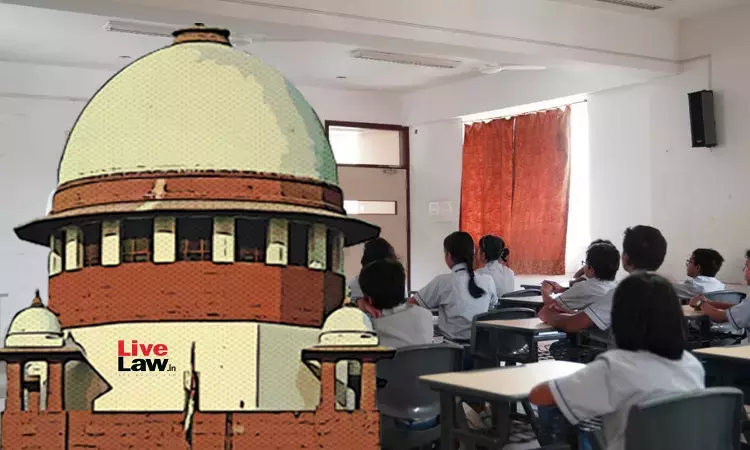B.Ed. Degree Not A Qualification For Primary School Teacher : The Supreme Court has upheld a judgment of the Chattisgarh High Court which quashed the appointments of B.Ed. Degree holders candidates as primary school teachers and reiterated that the essential qualification for such appointments is a Diploma in Elementary Education.

B.Ed. Degree Not A Qualification For Primary School Teacher Brief facts
A batch of petitions was filed challenging the judgment of the Rajasthan High Court dated November 25, 2021, whereby it held that for the appointment of primary school teachers, the essential qualification is D.E1.Ed (Diploma in Elementary Education) and not B.Ed. (Bachelor in Education). In this case, a 2018 notification of the National Council for Teachers Education, which held B.Ed candidates eligible for primary school teaching, was in question.
In the judgment of the Supreme Court in Devesh Sharma v. Union of India (2023), the findings of the Rajasthan High Court were affirmed and the 2018 notification was quashed.
The bench comprising Justice Aniruddha Bose and Justice Sudhanshu Dhulia had opined that the fundamental right of primary education in India as guaranteed under Article 21A of the Indian Constitution as well as the Right to Education Act, 2009 not just included ‘free’ and ‘compulsory’ education for children below 14 years of age but also included ‘quality’ education to be imparted in such children. As per the Supreme Court, B.Ed. degree holders did not pass the basic pedagogical threshold required for teaching primary classes and thus would not be able to provide ‘quality’ education to primary school children.
During the proceedings, the Court in April 2024 issued a clarification that those who were selected and appointed prior to the Devesh Sharma judgment, shall not be disturbed as there was a special equity in their favour. Therefore, any judgment pronounced in this case would be prospective in nature.
Despite the clarification issued, a batch of petitions were filed seeking clarification. The present petition arises from a judgment of the Chattisgarh High Court, which was passed following orders in Devesh Sharma.
Chattisgarh High Court’s judgment
The Chattisgarh High Court in its judgment on April 2, 2024 declared all candidates ineligible for selection to the post of primary school teachers, following the judgment in Devesh Sharma. It arose from petitions filed by Diploma holders in Elementary Education, challenging the eligibility of the B.Ed candidates.
However, the B.Ed candidates in this case argued B.Ed. is one of the qualifications for appointment of elementary school teachers under the Chhattisgarh School Education Services (Educational and Administrative Cadre) Recruitment and Promotion Rules, 2019.
It is an admitted case that the appointment orders in this case were issued after the judgment of Devesh Sharma.
Following this, the division bench of the High Court issued an interim order on August 21, 2023, whereby it kept the recruitment process in abeyance as regards B.Ed candidates.
This interim order was then challenged before the Supreme Court by B.Ed. candidates. By an order dated August 29, 2023, the Supreme Court uplifted the stay and allowed the recruitment of B.Ed candidates subject to the final outcome of the High Court. Ultimately, the petitions were decided in favour of the Diploma holders.
The April 29 order of the High Court is challenged before the Supreme Court by those teachers with B.Ed. qualifications whose appointments have been quashed.
Arguments of parties
Senior advocate Shrivastava, for petitioners, argued that Devesh Sharma’s judgment opened a small window for B.Ed. candidates.
What did the Supreme Court say?
The Supreme Court first clarified that the Devesh Sharma judgment did not open any window for the eligibility of B.Ed. candidates. It said: “All we had said in Devesh Sharma (supra) was that since the law, making B.Ed. as qualification, was not struck down by any Court (as was the position in Rajasthan when recruitment to the post of teachers were taking place in 2019) such candidates ought to have been called at least.”
The court further added: “As we know when recruitment to the post of teachers was being made in Rajasthan, B.Ed. was a qualification for teachers as per the NCTE notification. The above observation made by us was only to affirm the findings of the Rajasthan High Court which had although held that B.Ed. was not a valid “qualification” for primary teachers, yet cautioned that the Government could not have ignored the notification of the NCTE till it was declared illegal by a Competent Court.”
It pointed out that in Chattisgarh, the Court had simply held that the recruitment would be dependent upon the final decision of the Chattisgarh High Court which ultimately held against them.
The court therefore held: “How does our observations in Devesh Sharma (supra) help the petitioners, we simply fail to understand. This argument is totally misconceived. B.Ed. is not a qualification for a teacher in a Primary School. Moreover, this aspect has already been clarified in the order dated 08.04.2024, where only such candidates have been saved who were selected and appointed prior to our order dated 11.08.2023 in Devesh Sharma (supra).”
Therefore, the court concluded: “What is important is the date of appointment which is certainly after the cut-off date. They will stand disqualified, as they do not have the essential qualification for appointment as primary school teachers.”
The court also held that the qualification given in the Chhattisgarh Rules to the extent it makes B.Ed. a qualification also cannot be implemented, following the law laid down in Devesh Sharma. This is because Chattisgarh Rules were made subsequent to the Devesh Sharma judgment which had already quashed the notification of NCTE.
“In fact, we have been shown today an order of NCTE dated 04.09.2023 whereby the judgement in Devesh Sharma (supra) was communicated to Chief Secretaries of all State Governments for further appropriate action. In spite of this, appointments were given to B.Ed. candidates which was illegal and has now rightly been quashed, by the Chhattisgarh High Court,” the Court remarked.
